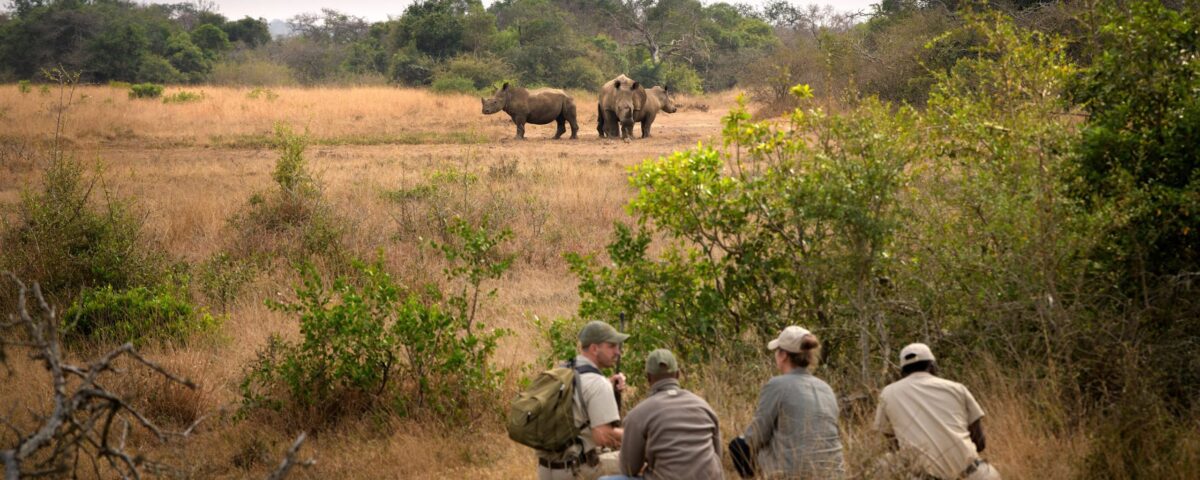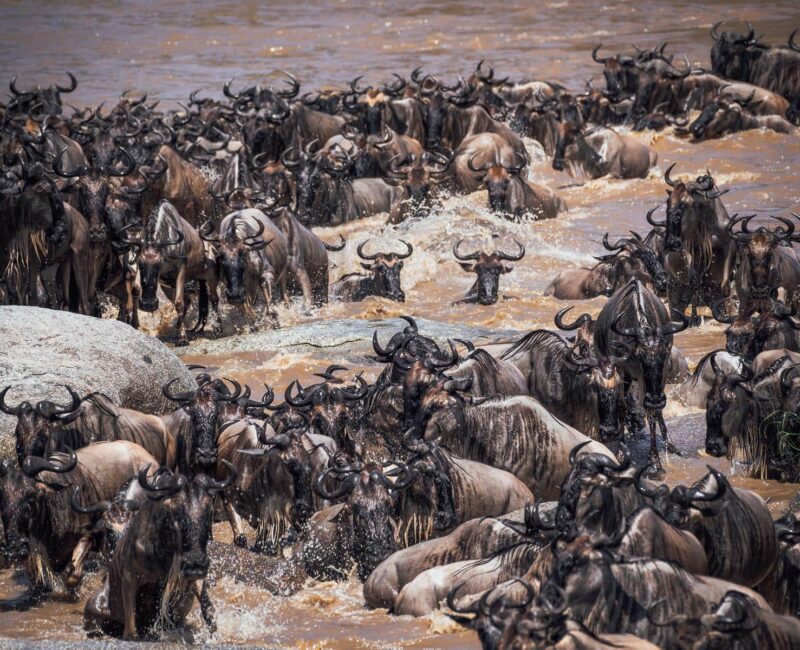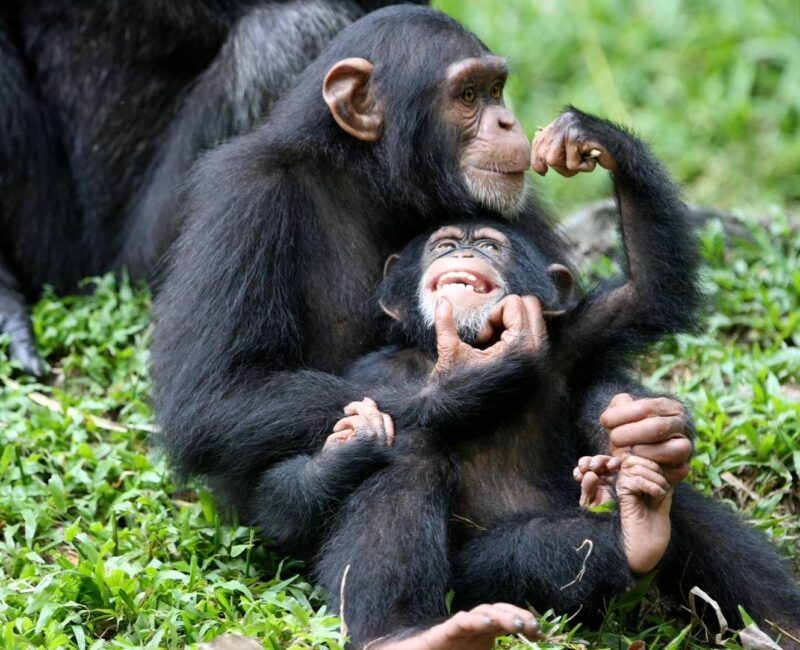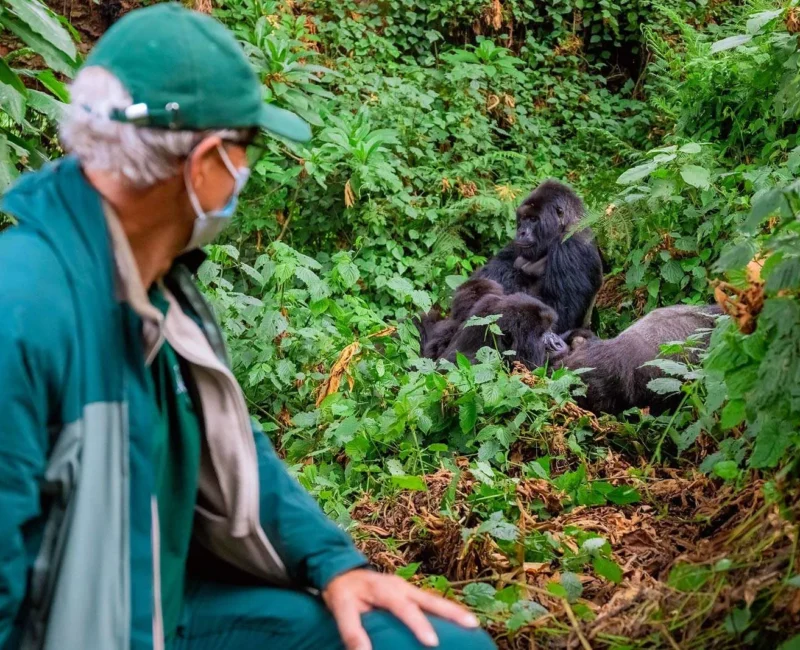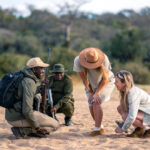
What Makes Walking Safaris in Uganda Unique Compared to Other African Countries?
October 15, 2025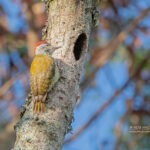
What Rare Bird Species Can I Find in Uganda?
October 16, 2025What Rules Should I Follow on a Walking Safari?
One of the most common questions travelers ask is, “What rules should I follow on a walking safari?” Walking safaris in Uganda are among the most intimate and rewarding ways to explore the wilderness. Unlike traditional game drives, where you observe wildlife from the comfort of a safari vehicle, walking safaris place you right in the heart of nature. You are guided on foot by expert rangers and trackers who help you spot wildlife, identify bird species, and learn about the ecosystems that sustain Uganda’s natural treasures. This slow-paced adventure allows you to appreciate details often missed during a vehicle safari—such as animal tracks, plant life, or the songs of rare birds.
Introduction: Understanding Walking Safaris in Uganda
Booking a walking safari through a professional operator like Nkofu Africa Safaris ensures that you experience these encounters safely and responsibly. Walking safaris are not only about seeing animals but also about learning how humans, wildlife, and ecosystems coexist. To fully enjoy this adventure, it’s essential to understand and follow certain rules. These guidelines are designed for your safety, the safety of your fellow travelers, and the well-being of the animals you encounter. Whether you are combining your trek with Uganda Gorilla Trekking Safaris, Uganda Chimpanzee Safaris, or even Uganda Birding Safaris, knowing the right rules to follow will guarantee that your trip becomes part of the unforgettable Uganda Best Safaris experiences.
Why Do Rules Matter on a Walking Safari?
A frequent question is, “Why are rules so important during a walking safari in Uganda?” The answer lies in both safety and sustainability. Walking safaris take you into the natural territory of wild animals, many of which can be unpredictable. Unlike in a vehicle, where you are relatively protected, being on foot requires heightened awareness and discipline. Rules exist to ensure you maintain a safe distance from wildlife, avoid startling animals, and minimize your impact on fragile ecosystems.
For example, during a walking safari in Murchison Falls National Park or Queen Elizabeth National Park, you may encounter elephants, buffaloes, or antelopes. Following ranger instructions ensures you avoid risky situations. Similarly, in Kibale Forest, where walking safaris are often combined with Uganda Chimpanzee Safaris, rules help reduce human impact on primates, keeping them comfortable and stress-free in their natural environment.
Moreover, rules are about respect—respect for the environment, for the communities living around the parks, and for Uganda’s conservation efforts. Adhering to guidelines means you are contributing positively to wildlife protection. Following these rules not only enhances your personal experience but also strengthens Uganda’s position as a leading destination for sustainable tourism, supporting the reputation of Uganda Safaris as ethical, safe, and world-class.
Rule 1: Always Follow the Guide’s Instructions
When travelers ask, “What is the number one rule I should follow on a walking safari?” the answer is simple: always listen to your guide. Walking safaris are led by trained and armed rangers who understand animal behavior, trail safety, and forest ecosystems. They are experienced in reading signs of wildlife presence, such as footprints, dung, or broken vegetation.
Ignoring your guide’s instructions can put you and the group at risk. For instance, if you come across a herd of elephants, the guide will know how to approach—or avoid—the situation. By following directions carefully, you not only stay safe but also increase your chances of seeing more wildlife. Professional operators like Nkofu Africa Safaris only work with certified guides, ensuring your walking safari is both safe and educational.
This rule applies whether you are enjoying Uganda Wildlife Safaris in savannah parks, Uganda Birding Safaris in wetlands, or even combining your walking safari with Uganda Gorilla Trekking Safaris. Your guide is your key to a safe, memorable, and authentic adventure.
Rule 2: Keep Noise to a Minimum
Another common question is, “How much noise can I make on a walking safari?” The rule is to keep as quiet as possible. Unlike a game drive where engine noise already masks human sounds, walking safaris place you directly in nature, where silence is essential. Talking loudly, laughing, or making unnecessary sounds can scare animals away or, worse, provoke aggressive behavior.
Silence also allows you to fully appreciate the environment. You’ll hear the rustling of leaves, the alarm calls of monkeys, or the distant roar of a lion. For bird enthusiasts on Uganda Birding Safaris, keeping quiet is crucial for spotting elusive species like the great blue turaco or the shoebill stork.
Quietness enhances the intimacy of your experience, allowing you to observe wildlife as it naturally behaves without disturbance. Nkofu Africa Safaris emphasizes this rule during pre-trek briefings, ensuring participants maximize their chances of spotting both large mammals and smaller creatures often overlooked on traditional Uganda Safaris.
Rule 3: Maintain a Safe Distance From Wildlife
Many travelers wonder, “How close can I get to animals on a walking safari?” The rule is simple: always keep a safe distance. Approaching wildlife too closely can be dangerous and stressful for the animals. Unlike zoos or sanctuaries, wild animals in Uganda’s parks are not accustomed to human proximity.
For example, while tracking chimpanzees in Kibale Forest or Budongo Forest, maintaining a respectful distance reduces the risk of transmitting human diseases to primates. Similarly, in Uganda Wildlife Safaris, approaching elephants or buffaloes too closely can provoke aggression. Rangers will always guide you on the correct distance to maintain depending on the situation.
Maintaining distance is not about limiting your experience but enhancing it. Observing wildlife naturally, without intrusion, ensures authentic encounters that align with conservation principles. When combining a walking safari with Uganda Gorilla Trekking Safaris, this rule becomes even stricter, as gorilla trekking has strict distance requirements for both human and gorilla safety.
Rule 4: Dress Appropriately for the Environment
Travelers frequently ask, “What should I wear on a walking safari?” Dressing appropriately is one of the most practical rules to follow. Neutral-colored clothing such as khaki, olive, or beige helps you blend into the environment, avoiding unnecessary attention from wildlife. Bright colors and flashy patterns can scare animals away or attract insects.
Comfortable walking boots are essential for navigating forest trails, savannah grasslands, and rocky terrain. Long sleeves and trousers protect against insect bites, sun exposure, and scratches from vegetation. A wide-brimmed hat, sunglasses, and sunscreen are useful in open savannah areas, while a light rain jacket is essential in forested regions prone to sudden showers.
Nkofu Africa Safaris provides travelers with detailed packing lists tailored to each itinerary. Whether you are enjoying Uganda Birding Safaris, Uganda Cultural Safaris, or combining your walking safari with Uganda Gorilla Trekking Safaris, dressing correctly ensures safety, comfort, and maximum enjoyment of your Uganda Best Safaris experience.
Rule 5: Avoid Sudden Movements and Running
Another vital question is, “What should I do if I encounter dangerous wildlife on foot?” The rule is never to run or make sudden movements. Running can trigger a predator’s chase instinct or provoke defensive behavior from animals like elephants or buffaloes. Instead, remain calm, follow your guide’s instructions, and back away slowly if necessary.
This rule is particularly important in areas like Queen Elizabeth National Park, where lions, leopards, and other predators roam. In Uganda Chimpanzee Safaris, sudden movements can also unsettle primates, making them nervous or aggressive. Walking calmly and confidently shows respect for wildlife and ensures everyone’s safety.
By learning to remain composed, you gain a deeper understanding of animal behavior and appreciate the thrill of being in the wild. Nkofu Africa Safaris emphasizes this rule in safety briefings, preparing you for all scenarios during your Uganda Wildlife Safaris adventure.
Rule 6: Respect the Environment and Local Communities
Many travelers ask, “How do I minimize my impact during a walking safari?” The rule is simple: respect the environment and the people connected to it. Do not litter, pick plants, or disturb natural habitats. Always carry reusable bottles and leave nothing behind except footprints.
Equally important is respecting the local communities surrounding Uganda’s national parks. Many walking safaris include cultural experiences where travelers engage with communities through dance, storytelling, or traditional craft demonstrations. These Uganda Cultural Safaris enrich your journey, offering insights into how local people coexist with wildlife and forests.
Nkofu Africa Safaris integrates cultural visits into walking safari itineraries, promoting responsible and sustainable tourism. Combining walking safaris with cultural experiences and Uganda Gorilla Trekking Safaris ensures a holistic approach that supports conservation and empowers communities. By following this rule, you help preserve Uganda’s beauty for future generations while enjoying authentic cultural immersion.
Conclusion: What Rules Should I Follow on a Walking Safari?
So, what rules should I follow on a walking safari? The answer lies in six essential principles: follow your guide’s instructions, keep noise to a minimum, maintain safe distances from wildlife, dress appropriately, avoid sudden movements, and respect both the environment and local communities. These rules guarantee safety, enhance wildlife encounters, and support sustainable tourism practices.
When combined with Uganda Gorilla Trekking Safaris, Uganda Chimpanzee Safaris, Uganda Birding Safaris, or Uganda Cultural Safaris, walking safaris provide a comprehensive and authentic Uganda Best Safaris experience. By booking through Nkofu Africa Safaris, you ensure professional guidance, expert-led treks, and enriching cultural activities, all conducted with respect for Uganda’s natural and cultural heritage.
Walking safaris are more than just an adventure—they are an educational and transformative journey that connects travelers to the heart of Uganda’s wilderness. By following the rules, you not only protect yourself and the wildlife but also contribute to Uganda’s global reputation as a leading destination for sustainable, responsible, and unforgettable safaris.

